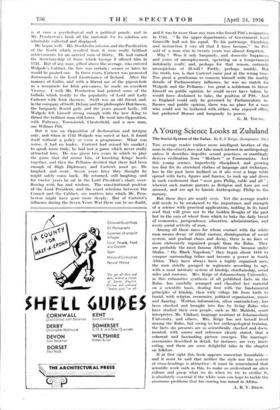A Young Science Looks at Zululand
THE average reader (rather more intelligent brother of the man-in-the-street) does not take much interest in anthropology unless it describes impolite sexual practices, or startlingly derives civilisation from " Mothers " or Communists. And this young science, imperfectly disciplined, and growing too fast for its stretched clothes of language and technique, has in the past been inclined as it sits over a huge table spread with facts, figures and fancies, to rock up and down in such excitement that "over goes Philip, table and all " ; whereat such mature parents as Religion and Law are not amused, and are apt to banish Anthropology Philip to the nursery.
But these days are nearly over. Yet the average reader still needs to be awakened to the importance and strength of a science with practical applications, holding in its hand seed that will grow not to the Golden Boughs of the past but to the ears of wheat from which to bake the daily bread of economics, jurisprudence, education, administration, and every social activity of man.
Among all those races for whom contact with the white man means decay of tribal custom, disintegration of social system, and gradual chaos and decay, there is no finer or more elaborately organised people than the Zulus. They are probably the most famous African tribe, because under Shake, "the Black Napoleon," they began about 1816 to conquer surrounding tribes and become a power in South Africa. They have always been a highly organised race, the . men strictly grouped in regiments according to age, with a most intricate system of kinship, chieftainship, social rules and customs. Mrs. Krige of Johannesburg University, in this exhaustive synthesis of all published facts on the Zulus, has carefully arranged and classified her material on a scientific basis, dealing first with the fundamental principles of kinship, then with village life from birth to burial, with religion, economics, political organisation, music and dancing. Written information, often contradictory, has been checked and brought into line by living Zulus who have studied their own people, such as Mr. Mahlobi, court interpreter, Mr. Vilakazi, language assistant at Johannesburg University, and others. Mrs. Krige has not herself lived among the Zulus, but owing to her anthropological training, the facts she presents are so scientifically checked and docu- mented, with source and reference clearly stated, that a coherent and fascinating picture emerges. The marriage- ceremonies described in detail, for instance, are very inter- esting, and there are some delightful tales in the chapter on folklore.
If at first sight this book appears somewhat formidable— and it must be said that neither the, style nor the system of cross-headings is attractive—it must be remembered that scientific work such as this, to make us understand an alien culture and grasp what we do when we try to civilise it, is absolutely essential if the white man can hope to tackle the enormous problems that his cominghas raised in Africa.
A. B. V. DREW.


















































 Previous page
Previous page